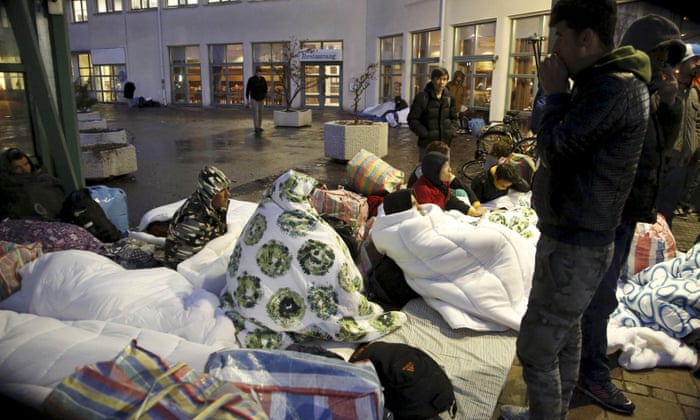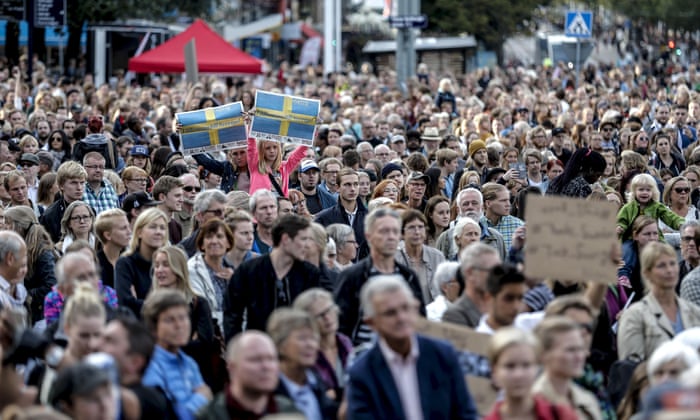'Do I regret it? Not for a second': Swedish journalist goes on trial for helping refugees
Fredrik Önnevall is in court this week facing charges of people smuggling after helping 15-year-old Abed travel to Sweden
 Refugees sleep outside the Swedish migration agency’s centre for asylum seekers in Malmo in November 2015. Photograph: Reuters
Refugees sleep outside the Swedish migration agency’s centre for asylum seekers in Malmo in November 2015. Photograph: Reuters
The suggestion sounded like an innocent joke, but it turned out to be deadly serious.
“Take me with you!” Abed asked Fredrik Önnevall.
It was the moment the journalist suddenly faced a dilemma: should he cease reporting on the refugee crisis for viewers back home and try solving a small part of it himself?
The camera captures the unscripted confusion (from 53 minutes in) that leaves Önnevall barely able to speak. “When you get such a direct question, what are you supposed to do?” he said. “All I can say is: I’ll give it a try.”
And so began a journey that will bring Önnevall, his cameraman and interpreter to court on Thursday to face charges of people smuggling, after they helped Abed, 15, get to Sweden from Greece while they were making a TV documentary, which was broadcast in 2015.
It was a choice faced by thousands of Europeans that year – can I do something directly to help a refugee? The alternative for Abed was to leap on to a speeding lorry leaving Athens. Later, Önnevall told police that if he had not helped the boy, the betrayal would have haunted him.
“It is a little difficult to grasp that we have become symbols of something much bigger than what we ourselves experienced,” Önnevall says.
“But it helps a lot that we don’t feel ashamed or embarrassed. Most viewers understand what we did, they can put themselves in our shoes – even if they disagree with us.”
When first broadcast, Önnevall’s story embodied the wave of sympathy that swept across Sweden as it opened its doors to 167,000 asylum seekers in 2015. Since then the mood has changed sharply.
 People attend a ‘Refugees Welcome’ demonstration in Gothenburg in September 2015. The national mood has since hardened. Photograph: Scanpix Sweden / Reuters/Reuters
People attend a ‘Refugees Welcome’ demonstration in Gothenburg in September 2015. The national mood has since hardened. Photograph: Scanpix Sweden / Reuters/Reuters
Sweden closed its border with Denmark a year ago, asylum centres were targeted by arsonists, and last autumn the country started deporting young Afghans to their homeland.
In Copenhagen, the courts have been accused of “criminalising decency” after citizens received stiff penalties merely for offering lifts to refugees, as the authorities sought to send a strong message on asylum. Hundreds of Swedes have been stopped by police for helping refugees across the bridge from Denmark, but only a handful have been charged with smuggling.
Courts in France have also tried to stop people from aiding refugees fleeing to Europe.
Önnevall’s case is set to clarify in Swedish law whether it is a crime to aid a human being in distress. “My understanding from the prosecutor is that the case is about lack of legal clarity in this situation,” Önnevall says. “I have no sense that I am being made an example of.”
The Danish author Carsten Jensen compares Önnevall’s situation with that of Kevin Carter, the South African photojournalist famous for his 1994 photo of a starving Sudanese toddler stalked by a vulture. Carter said he regretted not helping the girl; he later killed himself.
“Önnevall’s dilemma has become everyone’s dilemma,” Jensen wrote in the Swedish newspaper Sydsvenskan last weekend. “The great challenge that European civilisation is facing is perhaps not the integration of a million people from another culture, but the conquest of self necessary for citizens to do violence to their own principles of humanity.”
Abed has started a new life in Sweden, his family has joined him, and he and Önnevall talk regularly. But in Sweden’s new climate, Abed is one of the lucky ones.
“The situation is so much worse – people are not so friendly anymore,” says Susanna Udvardi of Act for Integration, a refugee support group in Simrishamn, southern Sweden, who featured in Önnevall’s films. “We have lots of sad cases of people being sent back, young Afghans who have realised there is no more hope.”
Udvardi is more bewildered than angry at the attempt to prosecute a man who became the face of Swedish reporting on the refugee crisis. “Why on earth are they doing it? They obviously were not smuggling people, it was not for money, they just wanted to be humanitarian,” she says.
Önnevall himself is clear that his motivation is not to take a stand, he just wants to carry on “telling other people’s stories and finding out why they think as they do”.
Would he do the same again? “It is a difficult question. With Abed I would draw the same conclusion, I knew the price of not helping him. Do I regret it? Not for a second.”
